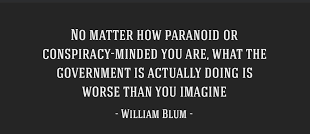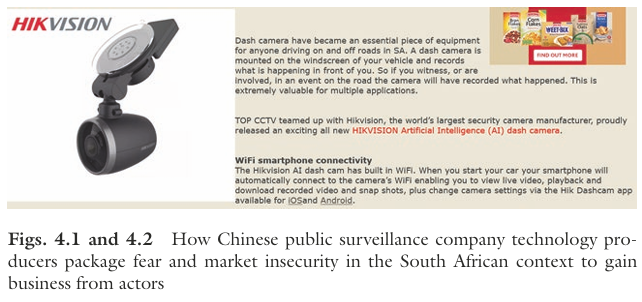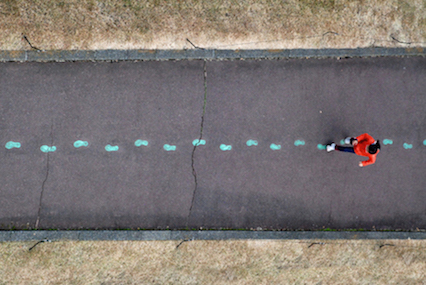Category: Free Inquiry
This is the category to apply to your Free Inquiry posts.

Rogue State, by William Blum
William Blum is an American journalist who has spent his career covering the actions of military intervention carried out by the US military and CIA. His book Rogue State, released in 2000, covers the many methods of the United States employs in combating mainly third-world political movements. In Rogue Empire, he also covers the methods of mass digital surveillance carried out internationally by American intelligence agencies, especially the NSA. Which, obviously, is a terribly useful resource for me in this project.
It was a simple coincidence which brought this book to me, I actually took it out from the UVic library several weeks ago. I picked the book up after reading Blum’s other book Killing Hope, an excellent book, but not one which specifically covers the US’s methods of digital surveillance. I am aware of how lucky it is to simply have such a good resource on hand during my work on this project.

A quote of his that I thought relevant.
Blum, William (2000). Rogue State: A Guide to the World’s Only Superpower, Common Courage Press.
Two excellent resources I have made available for me are that of the interviews and presentations of Chris Gilliard and Ian Linkletter. Ian Linkletter is an Emerging Technology and Open Education Librarian at the British Columbia Institute of Technology. He is also a public rights activist and has been raising awareness for Slapp lawsuits ever since he was sued by a monitoring software company. Chris Gilliard is the co-director of the Critical Internet Studies Institute, he also specializes in research in ‘luxury surveillance,’ and has a book of the same name coming out this year.

Ian Linkletter
Chris Gilliard spoke in his podcast-style talk on the growth of digital surveillance, both online and off-line. One of the concepts that he spoke of was “luxury surveillance,” where high-class and expensive technology, like apple watches and smart cars, act as a high-tech security cameras that constantly watch you. It is somewhat sinister how large companies spend millions of dollars on mass psychology operations to convince people that their products, that they make to sell to you for money, are the height of necessity and your possession of them reflects well on your social standing. Especially when these products are then used to track and monitor those who use them, and now with the new push to wear some kind of necklace or pin that you are always wearing and that is always listening.
Ian Linkletter generally specializes in the many ways in which digital surveillance is used to engage in unethical behavior in monitoring students. Digital proctoring is the act of using software when a student is engaging in cheating behavior when doing schoolwork online. Digital proctoring software observes you while you are engaging in schoolwork by observing your head movements and checking if you are still in frame. He covered how this digital proctoring software is often more active against students who are neurodivergent or disabled, as the actions that are defined as being ‘suspicious’ as they are more likely to fit the vague descriptions that the programs are compliant to. The digital proctoring software that scans a computer’s web-screen to check if a student’s face is present has also been known to discriminate, this time against people with darker complexions. Its advocates may claim that the software is ‘colorblind,’ and in one sense it quite literally is, but this does not change the fact that these unthinking programs are still pliant to the previously existing biases of those who made it, like how was pointed out in my blog of Nodin Cutfeet’s talk.
The first steps I took in researching my deeper dive topic with the rest of my pod was to search the UVIC library. The first resource that caught my eye was Digital Surveillance in Southern Africa: Polices, Politics and Practices by Allen Munoriyarwa and Admire Mare. The book covers the many methods of public and digital surveillance and the political justifications involved in establishing and maintaining it. The book’s preface states that surveillance is becoming increasingly common in the world and South Africa is becoming an especially bad case due to the lack of transparency and regulations, and the politicized nature of surveillance in South Africa.
Munoriyarwa and Mare detail the variety of methods used by the South African government and corporations to push for a greater surveillance methods. They explain how public surveillance companies promote fear in order to get their customers’ business:


Overall, the book is a good resource covering the general methods and the coercive political environment that makes this kind of wide-scale surveillance possible. An excellent resource, and not just for its ability to inform in the situation in South Africa, since it gives a picture of the extreme lengths that can be reached when wide-ranging surveillance is normalized.
Munoriyarwa, A., & Mare, A. (2022). Digital Surveillance in Southern Africa : Policies, Politics and Practices (1st ed. 2022.). Springer International Publishing. https://doi.org/10.1007/978-3-031-16636-5
This is where you share your updates and creations for Assignment 1: Free Inquiry Project.
